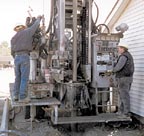
- people looking for information regarding that perfect rig for a cost at which you couldn't buy a used Volkswagon;
- entrepreneurs telling me that I can make $5,000 a month working from the comfort of my own living room;
- "get rich quick" messages from someone wanting to transfer money into your account.
But the message that really got my attention was worded like this: "What is being done indirectly to address the critical shortage of trained technicians regarding the drilling industry?" I don't know how many people I've talked to about this, but I am sure that not a week goes by that I haven't heard the question, "Don, I need a good young man for my business - where can I find him?"
Some people say the reason we can't get these people in for training is the lack of money. Money is a big part of the problem, but is it the only problem? The quality of drill service varies wildly from shop to shop, let alone from one coast to the other. Cutthroat competition is a fact of life in our industry. As a result of inadequate compensation and thin profit margins at the shop level, benefits are almost nonexistent. The explosion of technology has made "a commitment to" lifetime learning a job requirement, no longer an option. And the cost of that commitment - the personal tools involved and the investment in equipment - borders on the oppressive. Labor rates are continuing to be suppressed, and labor times, as represented in most of the shops, are unbelievably low.
Realistically, there are easier ways to earn a living. There are more lucrative professions to pursue and less demanding disciplines to master, but then again, there always have been these options. I feel that until the pay rate is raised, you can kiss the best people goodbye. As soon as the labor rate increases and pays what the job is worth - as well as paying benefits and making the workplace better - you will have grade A people knocking down the doors at your facilities. And when that is done, only the "A" grade customers will bother you, and all the price shoppers and crazies will go bother your competition.
Earlier we talked about what money can do to help train and keep good people, but I am not convinced that money is the only problem we face in this service industry. I am not even sure it is the most critical problem. Sure, we have a problem, but we need to have a look at productivity. Productivity needs to be on the same average as our labor rate, but I think that's impossible. Regardless of what we offer entry-level people, we must still recognize that the profession is demanding and is performed in difficult situations - working long hours, away from home and in a dangerous environment. How do you recruit young people and what do you do to motivate them? Will it be only money? I have a grandson who graduated from college with a starting salary that exceeds journeyman level salaries for our industry. He will never have to rent a truck and then try to figure out how he will move $40,000 worth of tools, small equipment and a $10,000 tool box from one job to another in search of different compressor work. Sure, money is a problem, and you won't make progress until the money gets better, but it won't get better unless, or until, we change how we see our industry or ourselves. It won't get better until we can increase productivity. It won't get better until each and every one of us demands that it must get better - until each and every one of us is willing to do whatever is necessary to make it happen.
Is it just the money? I don't think so. If the answer to all that ails the industry was that simple, the problem would have been corrected long ago. No, the money is certainly needed to help correct the problem, but that is not the only need. Maybe we need to ask the right questions and listen more carefully. If we can learn to ask the right questions, we will get the right answers. Just recently I was called out to the field to diagnose a compressor problem. Every time I asked a question to the drill owner, I was answered by a question, so I performed my tests and came up with the answer to the problem - which was corrected by replacing a fan motor and pump compensator. Before I left the customer's job site, he came to me and apologized for his unruly behavior concerning his questions, and said he should have listened more carefully.



Report Abusive Comment